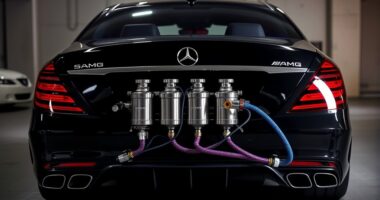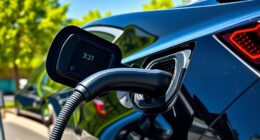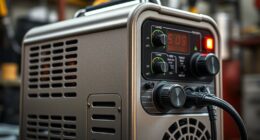Upgrading your Mercedes GLC or E-Class intercooler involves installing a larger, more efficient core with CAD-optimized end tanks and CFD-designed internals, which considerably improves heat dissipation and airflow. Coatings resist corrosion, ensuring long-lasting performance. These upgrades support better power, torque, and engine responsiveness while offering easy, plug-and-play installation. Optional features like water methanol injection further enhance cooling. Keep exploring to discover how these enhancements can boost your vehicle’s performance further.
Key Takeaways
- Upgraded larger intercooler core (222x297x95mm) significantly improves heat dissipation and overall cooling efficiency.
- CAD-optimized end tanks and CFD-designed internals ensure optimal airflow and uniform charge air distribution.
- Anti-corrosion coatings extend intercooler lifespan, maintaining performance under harsh environmental conditions.
- Plug-and-play installation fits select Mercedes GLC and E-Class models from 2016-2019 with no modifications needed.
- Enhanced cooling capacity supports higher engine power, torque, and longer turbocharger lifespan.
Upgrading the Core Size for Better Heat Dissipation
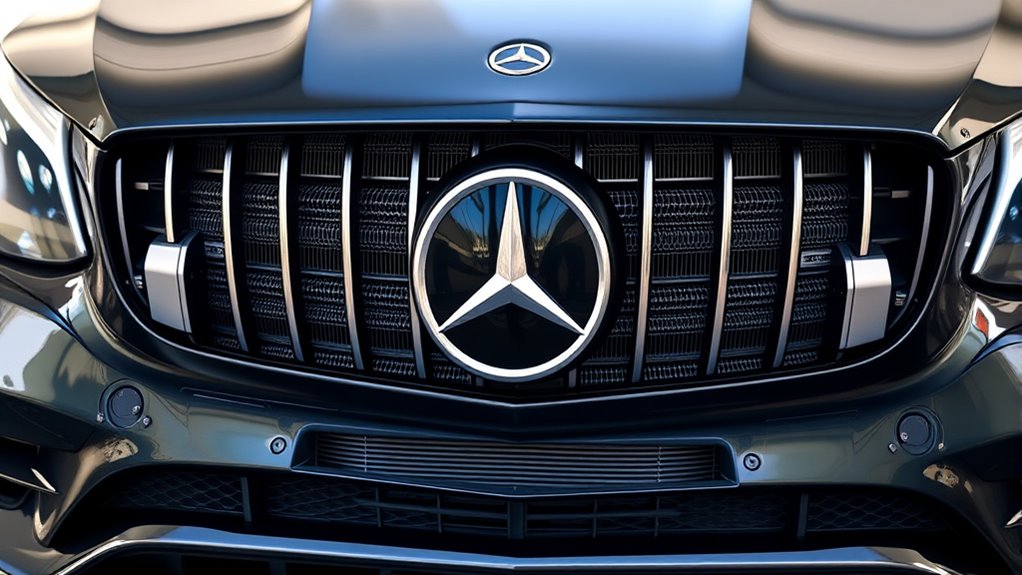
Upgrading the core size of your intercooler substantially boosts heat dissipation, especially during high-performance driving. A larger intercooler core increases internal airflow and improves heat transfer, which helps lower charge air temperatures for your Mercedes GLC or E-Class. This performance upgrade enhances cooling efficiency, ensuring your turbocharger stays protected under demanding conditions. With a core size expanded from 200mm x 207mm x 65mm to 222mm x 297mm x 95mm, you gain a +133% volume boost, allowing for better thermal management. This not only maintains ideal engine performance but also supports high-performance tuning. CAD-optimized end tanks and CFD-designed internals ensure the bigger core delivers maximum cooling without sacrificing airflow or increasing backpressure, providing long-term durability and power gains. Additionally, understanding the importance of system security can help ensure that such modifications are performed safely and responsibly, maintaining the integrity of your vehicle’s overall performance. Proper installation and thermal regulation are crucial to achieving the desired benefits and preventing potential issues. Incorporating high-quality cooling components can extend the lifespan of your engine and prevent overheating during extended drives. Furthermore, employing advanced cooling technology can further enhance heat dissipation efficiency, especially in demanding driving conditions. Implementing these enhancements can also contribute to overall vehicle longevity, making your upgrade a worthwhile investment.
The Benefits of Cad-Optimized End Tanks With CFD Simulations
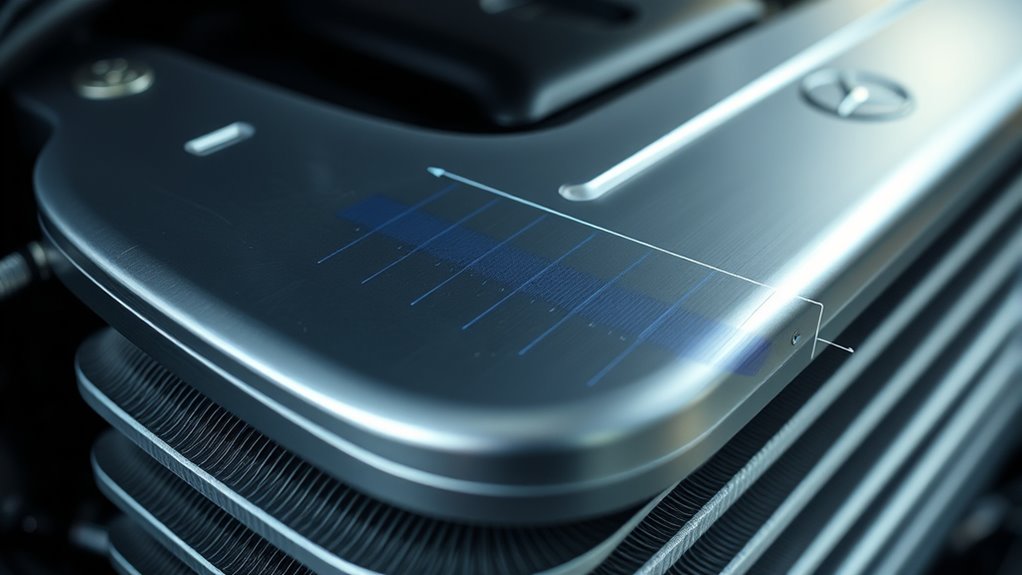
CAD-optimized end tanks substantially enhance the performance of your intercooler by precisely shaping internal airflow pathways. Using CFD simulations, engineers refine end tank geometries to minimize turbulence and pressure drops, ensuring smoother airflow. This meticulous process results in a more uniform distribution of charge air, boosting heat transfer efficiency and cooling performance. With better airflow management, your Mercedes GLC or E-Class intercooler reduces backpressure and improves engine response. CFD modeling also predicts thermal performance and structural integrity, guaranteeing durability under high-performance conditions. Incorporating CAD and CFD techniques creates aerodynamic end tanks that maximize intercooler effectiveness. These improvements result in a more efficient heat dissipation system, helping your vehicle maintain ideal performance and reliability during demanding driving situations. Understanding airflow dynamics is essential for optimizing intercooler design and ensuring maximum cooling efficiency. Additionally, by analyzing fluid flow behavior, engineers can identify potential points of airflow separation or turbulence, further refining the design for optimal results. Employing these advanced simulation tools leads to innovative cooling solutions that push the boundaries of intercooler technology.
Increased Core Volume and Its Impact on Performance

Increasing the core volume boosts heat dissipation, keeping your engine cooler during intense driving. This improvement directly enhances power output and responsiveness by maintaining ideal air density. As a result, your vehicle performs consistently, even under demanding conditions. Properly optimized voiceover scripts can further communicate these benefits effectively to your audience. Additionally, understanding the refrigeration cycle principles helps in designing cooling systems that maximize efficiency and durability. Implementing risk management strategies in your cooling system design can also promote sustainable and environmentally friendly modifications.
Improved Heat Dissipation
Expanding the intercooler core volume from 2.7L to 6.3L dramatically boosts its heat transfer capacity, which in turn lowers charge air temperatures during demanding driving conditions. This improved heat dissipation enhances cooling efficiency, ensuring the turbocharger operates at *ideal* temperatures and reducing thermal stress. As a result, your Mercedes GLC maintains consistent performance, even under high load. The larger core improves internal airflow, facilitating quicker heat transfer and minimizing temperature spikes. This not only preserves engine power but also prolongs turbocharger lifespan. With better heat management, you’ll experience more responsive acceleration and sustained performance during aggressive driving or racing. Additionally, enhanced cooling can help mitigate oxidative stress on engine components, further extending their durability. Proper heat management is especially important for maintaining optimal performance and preventing long-term damage. Moreover, effective cooling solutions can contribute to reducing thermal stress, which is crucial for engine longevity. Improved intercooler efficiency can also lead to better fuel economy, as cooler intake air supports more complete combustion.
Enhanced Power Output
By enlarging the intercooler core volume from 2.7L to 6.3L, you substantially boost the system’s ability to transfer heat away from the charge air. This larger core improves heat transfer efficiency, allowing cooler, denser air to reach the engine. As a result, your Mercedes GLC experiences enhanced power, with better performance and increased torque. The bigger core helps maintain consistent boost levels and reduces charge air temperatures during high-demand driving. Improved cooling also enhances engine response and reduces turbo lag, making acceleration smoother and more immediate. Additionally, the larger intercooler provides better protection for turbochargers by keeping intake air cooler, which prolongs component lifespan and ensures sustained performance. Furthermore, an upgraded intercooler can contribute to overall efficiency and system reliability, helping to maintain optimal operation over time. Overall, the increased core volume translates directly into a more responsive, powerful driving experience.
Durable Anti-Corrosion Coatings for Long-Term Reliability

A durable anti-corrosion coating is essential for protecting your intercooler against rust and environmental damage. It helps extend the component’s lifespan by resisting corrosion even in harsh conditions. This coating also boosts surface durability, ensuring your intercooler maintains ideal heat transfer over time.
Corrosion Resistance Benefits
Durable anti-corrosion coatings play a crucial role in guaranteeing the long-term reliability of intercoolers in Mercedes GLC and E-Class models. These coatings provide exceptional corrosion resistance, protecting against rust, moisture, salt, and road debris. By preventing oxidation, they maintain ideal heat transfer efficiency and preserve the intercooler’s performance over time. The anti-corrosion coating is specially formulated for harsh driving conditions, offering increased durability and reducing maintenance needs. This environmental protection ensures the intercooler remains effective longer, delivering consistent cooling and pressure resistance. Additionally, corrosion resistance is vital for maintaining the structural integrity of the intercooler, especially in regions with harsh climates. Incorporating protective coatings further enhances longevity by creating a barrier against environmental damage, ensuring the intercooler sustains optimal function throughout its lifespan. Implementing these coatings also supports long-term reliability, minimizing the risk of costly repairs and replacements. Proper application of these coatings can also prevent issues associated with material degradation, which is common in vehicles operating in severe conditions. Furthermore, using high-quality coatings can improve the intercooler’s resistance to environmental factors, ensuring consistent performance regardless of external conditions.
Extended Component Lifespan
Enhanced anti-corrosion coatings markedly extend the lifespan of intercoolers in Mercedes GLC and E-Class models, even under tough driving conditions. By protecting the intercooler from rust and corrosion, these coatings ensure long-lasting performance and preserve structural integrity. The anti-corrosion treatment maintains ideal heat transfer efficiency over time, preventing degradation during high-temperature operation. This durability reduces the need for frequent maintenance, saving you time and costs. With corrosion-resistant materials and coatings, your intercooler remains reliable for up to four years under normal use. This enhanced protection not only shields the internal and external surfaces but also supports consistent cooling performance, contributing to the overall longevity of your vehicle’s intercooler and ensuring it withstands demanding driving environments.
Enhanced Surface Durability
To guarantee long-term reliability, Mercedes GLC and E-Class intercoolers are equipped with specially formulated anti-corrosion coatings that provide outstanding resistance against environmental damage. This coating shields the aluminum core from rust and oxidation, ensuring consistent heat transfer and preventing performance decline. It’s designed to withstand high temperatures, thermal stress, and moisture exposure, substantially extending the intercooler’s service life. The enhanced surface durability reduces maintenance needs and replacements, maintaining peak performance over time. By protecting against environmental elements, this anti-corrosion layer ensures the intercooler remains efficient even under demanding conditions.
- Provides exceptional environmental resistance for prolonged durability
- Maintains heat transfer efficiency by protecting the aluminum core
- Supports high-pressure and thermal stress endurance during intense driving
Compatibility With Mercedes GLC and E-Class Models
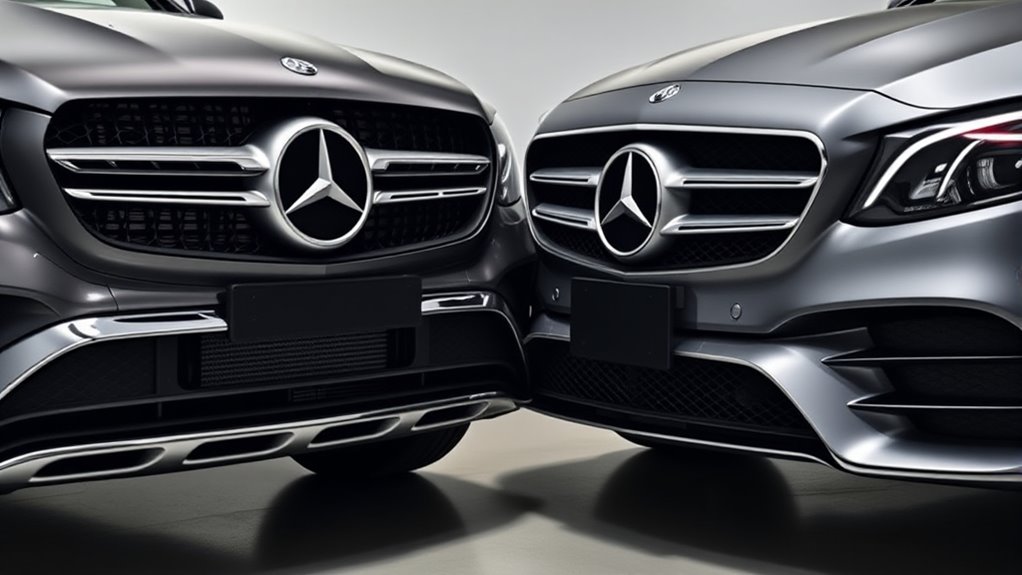
This intercooler kit is designed to fit select Mercedes GLC and E-Class models from 2016 to 2019, ensuring broad compatibility across popular variants. It’s suitable for Mercedes GLC and E-Class vehicles equipped with 3.0L V6 biturbo engines, including AMG models like GLC 43 AMG and GLC 63 AMG, as well as E43 AMG and E450 AMG 4MATIC. The kit’s dimensions, measuring 222 mm x 297 mm x 95 mm, provide a 133% volume increase over stock, boosting engine cooling and performance. Its plug-and-play design makes it compatible with indirect charge-air cooling circuits, streamlining installation and ensuring a seamless fit. Whether you’re upgrading your AMG or standard variant, this intercooler is a reliable performance upgrade compatible with a range of GLC and E-Class models.
Easy Installation and Plug-and-Play Convenience
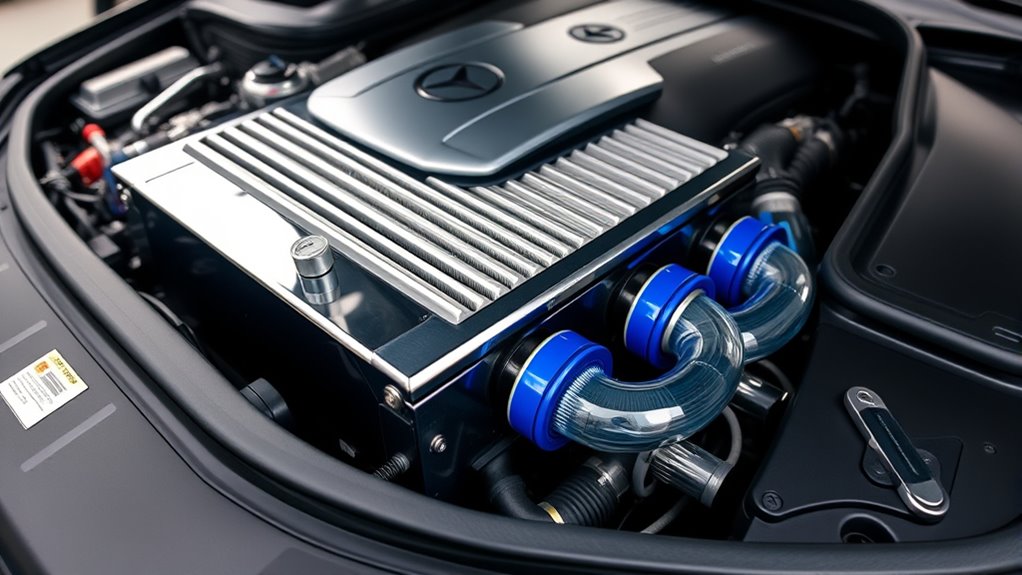
Installing the intercooler kit is a straightforward process thanks to its plug-and-play design, which requires no custom modifications. You can upgrade your Mercedes GLC or E-Class quickly and easily, thanks to the compatibility and modular design of the system. The pre-assembled components allow for fast mounting and simple connection of boost pipes and hoses, minimizing downtime. The detailed instructions guide you step-by-step, ensuring a hassle-free installation. With its high pressure resistance, this intercooler kit delivers reliable performance under all driving conditions. Whether you’re performing a quick upgrade or a more involved enhancement, the system’s design makes it accessible to both amateurs and professionals alike.
- Quick installation with minimal tools
- Compatible with existing Mercedes models
- Seamless integration with pressure-resistant components
Optional Water Methanol Injection System Integration
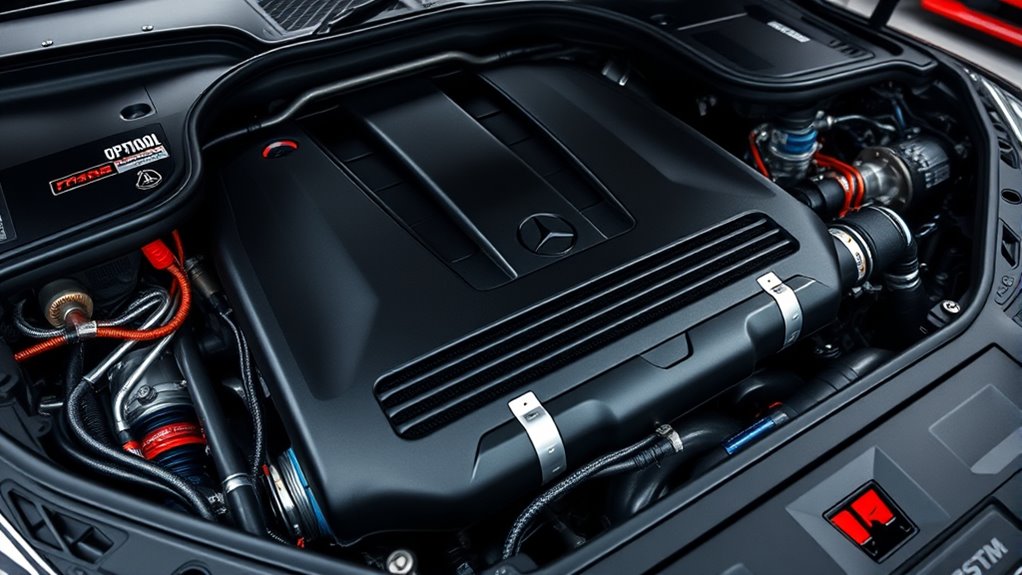
Enhancing your Mercedes GLC or E-Class intercooler setup with an optional water methanol injection (WMI) system offers a significant boost in cooling capacity and performance. The intercooler kit includes WMI ports, specifically designed for easy integration of water methanol injection systems. These ports allow you to precisely install nozzles that inject water methanol directly into the charge air, further lowering charge air temperatures. This improves cooling performance and reduces the risk of knocking during high-boost conditions. When connected to your existing water methanol injection kit, the system can provide a consistent power increase by keeping intake temperatures down. The WMI system works seamlessly with the performance intercooler and boost pipe, maximizing horsepower and torque during demanding driving or racing scenarios.
How the Larger Intercooler Improves Power and Torque
A larger intercooler considerably boosts your vehicle’s power and torque by improving heat dissipation and airflow. With a 133% increase in core volume, it allows for more effective heat transfer, keeping charge air temperatures lower. This enhanced cooling reduces backpressure, enabling better airflow through the turbocharger, which directly improves performance. When intake air stays cooler, the engine can generate more boost and torque, resulting in faster acceleration. Additionally, maintaining optimal charge air temperatures enhances combustion efficiency, maximizing power output.
- Better heat transfer leads to cooler, denser air for improved performance
- Reduced backpressure increases airflow and torque gains
- Enhanced cooling boosts overall efficiency and power output
Warranty and Support for Long-Term Performance Assurance
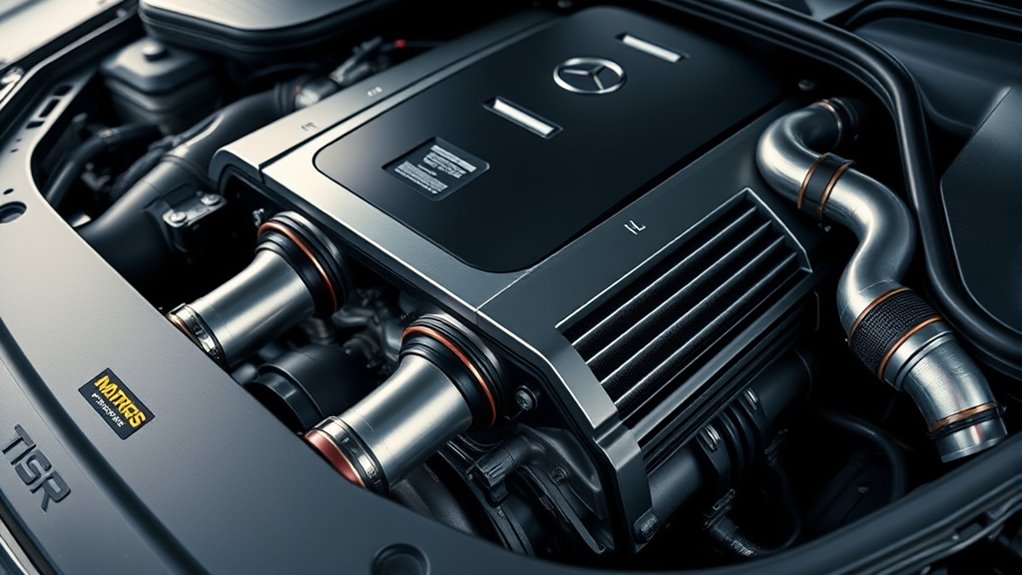
To guarantee your intercooler continues performing reliably over the long term, Wagner offers an extended warranty of up to four years, giving you peace of mind with your upgrade. This warranty ensures support for your intercooler’s long-term performance, emphasizing durability and reliability. The intercooler’s corrosion-resistant coating helps prevent damage from corrosion, maintaining its efficiency over years of use. Its robust design features 100% pressure resistance, ensuring consistent performance even under demanding conditions. Wagner’s customer service provides thorough support, addressing any manufacturing issues promptly. Investing in performance upgrades with Wagner means you benefit from long-lasting durability and dependable support, safeguarding your vehicle’s performance over time. With their warranty coverage, you can confidently enjoy enhanced power and efficiency, knowing your intercooler is protected.
Frequently Asked Questions
What Difference Does an Upgraded Intercooler Make?
You’ll notice an upgraded intercooler makes a big difference. It cools the charged air more effectively, keeping engine temperatures lower and boosting performance. With better airflow and heat transfer, your engine runs smoother and more consistently. Plus, it reduces backpressure, allowing for higher boost and more torque. Overall, you get more horsepower, quicker acceleration, and improved turbocharger longevity, making your driving experience more powerful and reliable.
How Much HP Does a Good Intercooler Add?
A good intercooler can boost your engine’s horsepower by keeping intake air cooler and denser. You might see an increase of around 10-20 HP, with high-quality options like Wagner delivering up to 15-25 HP gains. This improvement reduces turbo pressure loss and maintains consistent boost, maximizing your engine’s potential. While other mods help, upgrading your intercooler alone can considerably enhance your vehicle’s performance.
Conclusion
Think of upgrading your intercooler like giving your Mercedes a breath of fresh air, revealing new levels of power and efficiency. With these enhancements, you’ll experience cooler temps, sharper performance, and long-lasting reliability. It’s like tuning your engine’s lungs for ideal airflow—helping your GLC or E-Class run smoother, stronger, and ready to conquer the road ahead. Embrace the upgrade and let your vehicle’s performance soar to new heights.


